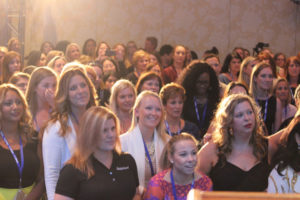Are You Really Listening to Your Biggest Customer – Women?!
In advance of my keynote and breakout session at the Women in Automotive Conference, I shared the following article on the purchase power and influence women have as consumers. Does your company recognize the power of women in the marketplace and in the workplace?
Women in the US buy or Influence over 80% of all car purchases yet most automakers, dealers, and salesmen treat them like a niche.
Consider these three facts from Sheconomy founder, Stephanie Holland:
- Women in the U.S. Buy, 65% of all new cars, 45% of all light trucks and SUVs and influence 80% of all car purchases
- 75% of women feel misunderstood by car marketers
- 95% of the country’s 20,000 auto dealers are owned and operated by men
The Next Killer App for greater revenue growth and improving operating profit is not a technology; it’s about unleashing the Power of Women in your organization. To survive and prosper it is incumbent on leaders to move their organization to a deeply internalized approach regarding gender differences, executed with a sense of urgency, to create competitive advantage.
Fara Warner has some helpful questions in her book, The Power of the Purse: How Smart Businesses are Adapting to the World’s Most Important Consumer – Women.
- Does your organization, its marketing department, your ad agency and your sales force truly grasp and understand women?
- Do you have a stereotypical view of women consumers that has not changed in the more than a year?
- Do you still think of women as a minority?
- Are you afraid to be the first in your industry to think to focus on women and if you do, do you think that will turn off male consumers?
- Do you think one ad campaign or marketing message will work on all women?
As you ponder these questions, here are my quick takeaways:
As a senior leader of your organization, you have to be constantly thinking and posing these questions to your corporate marketing department and implementing measures and metrics as a portion of your strategy for delivering business results for women.
- Don’t homogenize women: This is the no-brainer. Every woman is unique and multidimensional and it is unwise to have a one-size fit all approach to marketing and selling to women.
- Millennial women are not their moms: Millennial women are nothing like their mother. They buy different things and place a greater cache on uniqueness and individuality and the impact their buying has on the society and environment at large (Case in point: think of their locally sourced, cage-free, hand-raised, hand-picked eggs buying behavior.)
- The future is multicultural: We know America is set to be a minority-majority nation by 2043 where the population is going to be majority non-white. Given this reality, what is your organization doing to market to an audience where the non-white woman is eager and willing to try your product or service?
- Educate the men in your organization: Men still represent 85% of leadership in most companies, which means they are 85% of the problem and 85% of the solution. The visible and vocal commitment of the men in your organization is critical to driving change.
Additionally, to drive long-term systemic change for women in your organizations I advise senior male leaders to Listen, Learn and Lead and Have the Will to Change.
- Listen: Find a female cultural coach, someone you can have an honest discussion with regarding the real experiences women are having in your company and industry. I encourage men to actively Listen to their female colleagues. You will find that men and women are having significantly different experiences in the workplace — and in the marketplace.
- Learn: I encouraged leaders to write detailed business cases tied to revenue, profit and, company reputation. By doing this exercise men deepen their understanding of the business case for women in their organization and their division. The written business case will serve as a roadmap for action, milestones, and team accountability.
- Lead: To be a champion of change you must lead by example — call out bias as it happens, visibility and vocally support the business case and action plan, and hold others accountable for their role in creating change.
- Will to Change: Leadership takes having the will to change. Having the will to challenge status quo. It’s what great leaders and great companies do. Men owe it to themselves, their companies, employees, and shareholders to do a better job in advocating for women.
The choice is simple. You can either choose to engage in this conversation or realize you will soon become the next Sears or Circuit City. The choice is yours.
Jeffery Tobias Halter is a corporate gender strategist. The country’s leading expert on engaging men to advance women. Jeffery is the President of YWomen, a strategic consulting company. The former Director of Diversity Strategy of The Coca-Cola Company. A highly sought-after speaker, Jeffery is a two-time TEDx speaker and frequently talks at industry and corporate events. He will be speaking at Women in Automotive Conference – delivering a keynote “Why Women: The Leadership Imperative to Advancing Women and Engaging Men” and a session on “Selling to Men. Selling to Women.”


